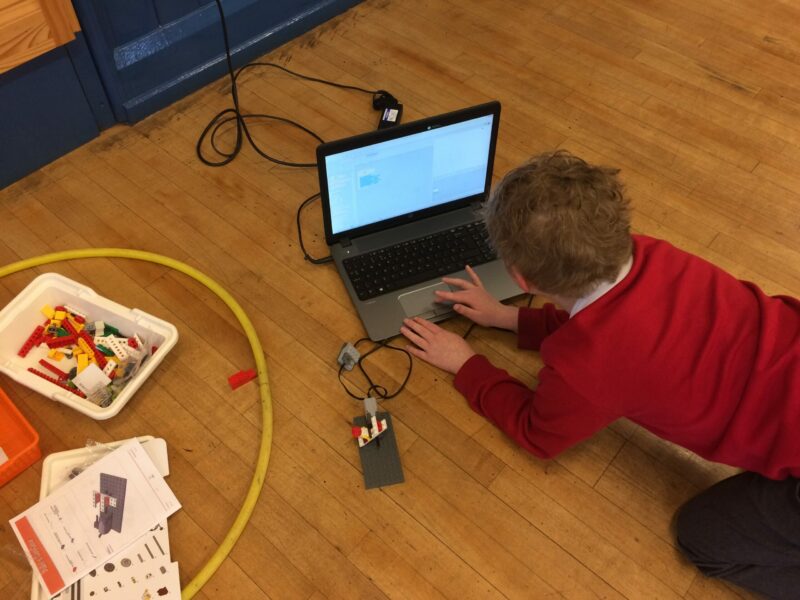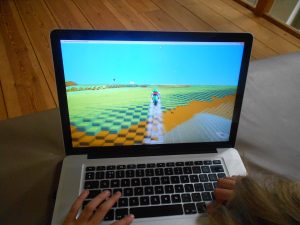- Grange-over-Sands,
- Cumbria LA11 6LE

Subject Leader: Mrs Curwen
Intent
We passionately believe in exciting children about the art, as well as the science, of computing and aspire to teach it in engaging, creative, ways to inspire the next generation of digital creators. We aim to build pupil resilience and problem-solving skills through activities that challenge and deepen knowledge and understanding. All children are encouraged to believe in their ability and we seek to actively encourage tinkering, curiosity and perseverance. We aim for our pupils to develop mastery across the three strands of the computing curriculum: Computer Science, Information Technology and Digital Literacy (including E-safety). Lessons are sequenced so that concepts are developed in logical steps with the aim of pupils mastering previous concepts before moving on to the next stage.
We will regularly invest in high-quality equipment and updates which will enhance our computing curriculum.
We want our teachers of computing and subject leader to have a positive mindset towards the subject and strong subject knowledge that is shared with our pupils.
iCompute Rationale:
iCompute supports schools in teaching computing effectively and well by providing a rich, broad and balanced computing curriculum fully mapped to the National Curriculum for Computing and Key Stage 1 and 2.
It offers a computing education designed for mastery using research-led computing pedagogies and covers all three strands of the computing curriculum:
• Computer Science
• Information Technology
• Digital Literacy (incl. eSafety)
The curriculum enhances pupils’ enjoyment, resilience, understanding and attainment in computing by empowering and equipping schools to deliver a quality computing education with comprehensive computing schemes of work.
It is designed and written by a Primary Computer Science Master teacher who is part of the group responsible for drafting the National Curriculum for Computing and funded by the DfE to prepare schools for teaching it.
iCompute’s expertise and innovation in computing teaching has been recognised each year by the prestigious British Educational Training and Technology (BETT) Awards and Education Resources Awards (ERA).
Implementation
At Lindale, we teach computing discretely across the school. We deliver our computing lessons using the iCompute scheme and ensure clear progression of the curriculum. Please see the iCompute Coverage and Progression Document: iCompute-coverage-and-progression (visit www.icompute-uk.com to find out more).
In our lessons, the children follow detailed step-by-step progression to learn about how computers and computer systems work. They learn how to design and write computer programs using a rich variety of programming languages. Some examples of this are that they create their own websites, write smartphone apps and produce animations and games. We provide a range of experiences for our pupils using a variety of hardware and software covering the full National Curriculum and beyond. Year 5 and 6 regularly have a Lego Robotics Day led by BAE Systems. Our pupils also benefit for the vast experience and in-depth knowledge of Mrs Liane O’Kane (a computing scientist, Primary Computer Science Master Teacher and creator of iCompute) who comes in to lead sessions and sometimes trial new units of work.
Progress is assessed by class teachers using a variety of methods. The Chris Quigley Milestones are used to assess coverage. Gaps and misconceptions are picked up on in future planning. Attainment in computing is reported to parents at the end of the year.
We regularly update our computer equipment and in school we have a wide range of resources to meet and enhance the National Curriculum such as sets of iPads and laptops, Spheros, Lego programming sets, interactive screen in each classroom, VR headsets and a range of software. Our equipment is regularly maintained by our IT provider.
Subject leaders are supported by the iCompute Subject Leader Toolkit. Self-evaluations are carried out. We support our staff with their professional development through our link with Mrs Liane O’Kane who regularly comes in to teach groups of children which also provides CPD for our staff. Our staff are able to contact Mrs O’Kane for any queries or support. Training opportunities are sought. Staff are further supported by detailed step-by-step iCompute planning.
Discrete e-safety lessons are taught and additional sessions are put into place as needed depending on the needs of cohorts. E-safety is also covered through units as applicable. We regularly share e-safety information with parents. Please see our webpage https://www.lindale.cumbria.sch.uk/e-safety-advice-parents/
Impact
Our pupils have enjoyment for computing, have confidence using a wide range of hardware and software, and can see its real-life applications. Many pupils develop a passion for the art and science of computing and continue with learning outside of school. They are able to experience a wide range of hardware and software giving them full coverage of the National Curriculum and beyond. The majority of children reach at least expected by the end of the year with many reaching greater depth – we often foster a deeper understanding of computing.
Our pupils are resilient to setbacks when working with technology and often have the initiative and confidence to tinker in order to solve a problem. Our school value of perseverance is often observed in computing lessons.
Our pupils know how to keep themselves safe online and can talk about this and put it into practice.

Making Xbox Games

